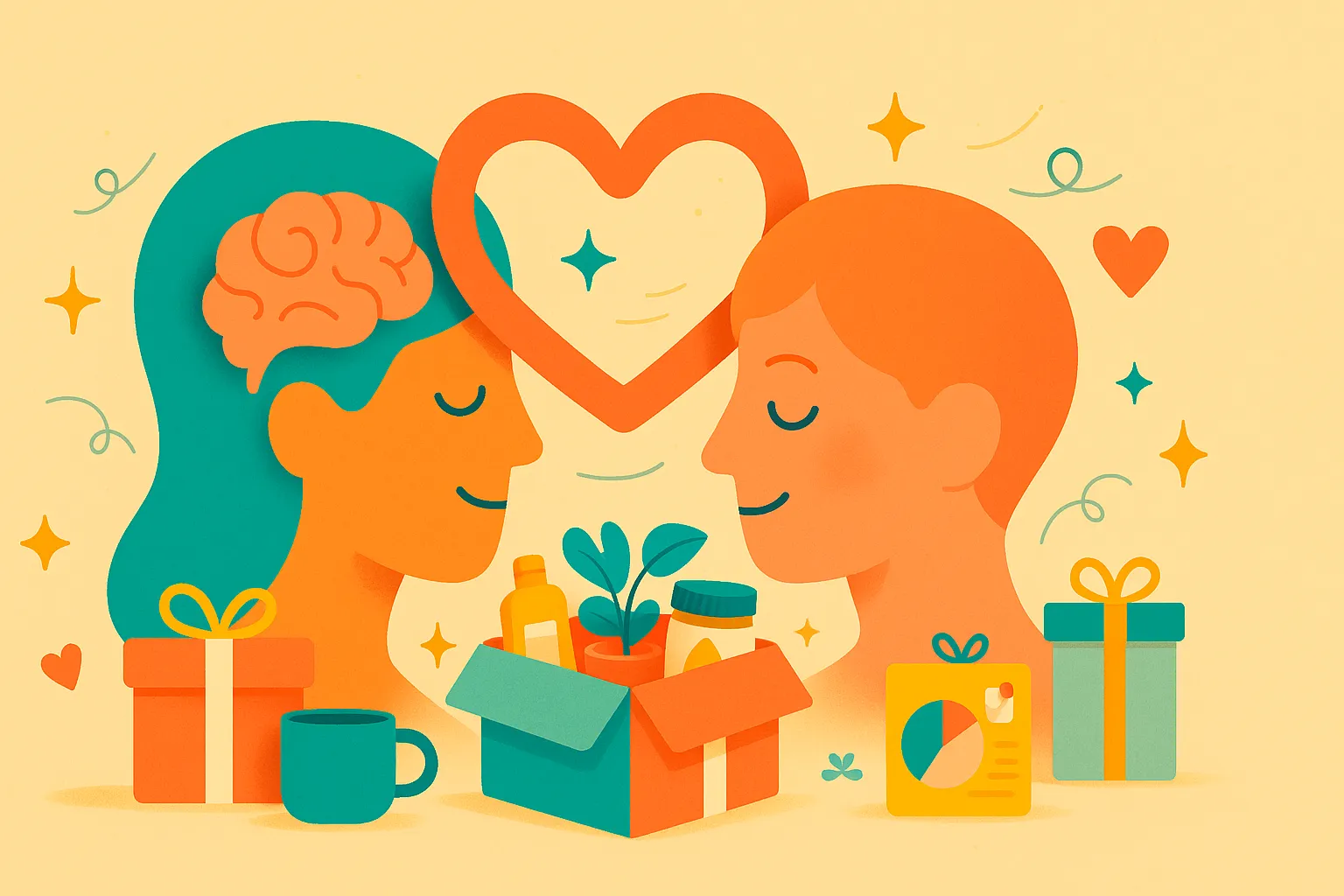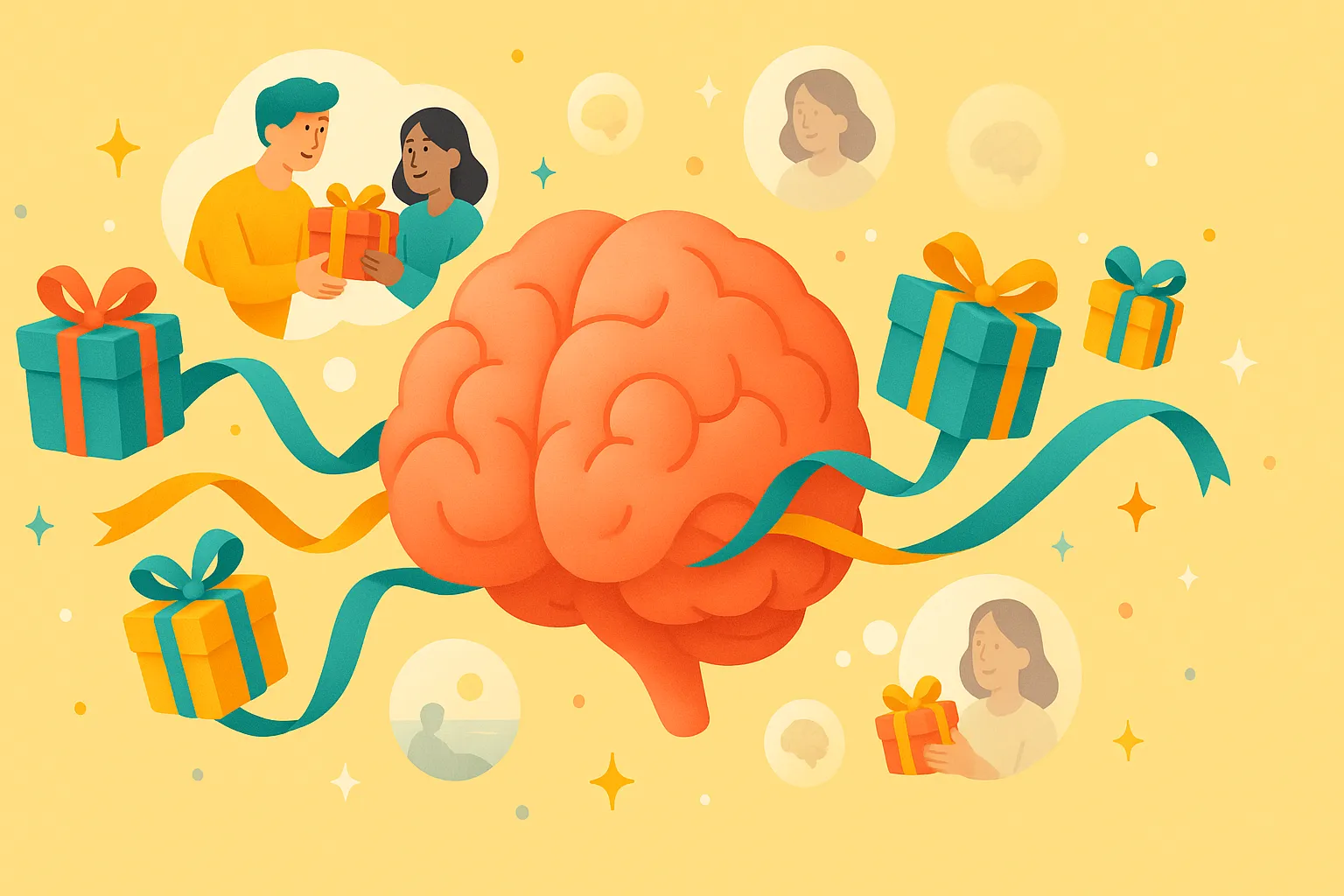Human connection isn’t just a nice-to-have—it’s a fundamental biological need that shapes our health, happiness, and even our survival. From the moment we’re born, our brains are wired to seek connection with others. But what does the science actually tell us about why we need each other, and how can we strengthen these vital bonds in our increasingly digital world?
The truth is, we’re not meant to go through life alone. Our ancestors survived and thrived because they worked together, shared resources, and supported each other through difficult times. This evolutionary history has left an indelible mark on our biology, psychology, and behavior. Today, despite our technological advances, our fundamental need for human connection remains unchanged.
🎯 Want to strengthen your relationships through thoughtful gestures? Our AI Gift Idea Generator can help you discover meaningful ways to show the people in your life how much you care!
The Biology of Connection: How Our Brains Are Wired for Relationships
The Social Brain Hypothesis
Our brains have evolved to be social machines. Research shows that the human brain is significantly larger than other primates’ brains, and this extra size is primarily dedicated to social processing. We have specialized neural networks for reading facial expressions and emotional cues, understanding others’ intentions and mental states, processing social information and relationship dynamics, and regulating our own emotions in social contexts.
This “social brain” theory suggests that our cognitive abilities evolved primarily to help us navigate complex social relationships. Our ancestors who were better at reading others, cooperating, and maintaining social bonds were more likely to survive and pass on their genes. This evolutionary pressure has shaped our brains to be exquisitely attuned to social information.
The Neuroscience of Connection
When we connect with others, our brains release a cascade of feel-good chemicals that reinforce our desire for social interaction. This neurochemical symphony creates the warm, satisfying feeling we experience during meaningful connections.
Oxytocin - Often called the “love hormone,” oxytocin promotes bonding, trust, and social connection. It’s released during physical touch, eye contact, and meaningful conversations. This powerful hormone not only makes us feel good but also strengthens our immune system and reduces stress.
Dopamine - This neurotransmitter creates feelings of pleasure and reward when we engage in social interactions, reinforcing our desire to connect. It’s the same chemical that makes us feel good when we achieve goals or receive positive feedback.
Serotonin - Social connection helps regulate serotonin levels, which are crucial for mood stability and emotional wellbeing. Low serotonin is associated with depression and anxiety, while healthy levels promote feelings of contentment and security.
Endorphins - These natural painkillers are released during positive social interactions, creating feelings of warmth and contentment. They’re the body’s way of rewarding us for maintaining social bonds.
The Health Benefits of Human Connection
Physical Health: Connection as Medicine
The research is clear: strong social connections are as important for our physical health as diet and exercise. In fact, some studies suggest that social isolation may be as harmful to our health as smoking 15 cigarettes a day. This isn’t just correlation—there are clear biological mechanisms that explain why connection is so vital to our physical wellbeing.
The famous Harvard Study of Adult Development, which followed participants for over 80 years, found that the quality of our relationships is the strongest predictor of happiness and health in old age. Not wealth, not fame, not even intelligence—but the strength of our social connections. People with strong social ties live 2-3 years longer than those without, and social isolation increases mortality risk by 50%—comparable to smoking 15 cigarettes daily.
When we feel connected and supported, our bodies produce fewer stress hormones and more immune-boosting compounds. This creates a positive feedback loop where good relationships lead to better health, which in turn makes us more capable of maintaining those relationships. Social connection strengthens our immune response, and people with strong relationships recover faster from illness and surgery.
The simple act of holding someone’s hand during a stressful situation can significantly reduce our physiological stress response. This is why having a trusted friend or partner to lean on during difficult times is so crucial for our health. Social support buffers the effects of stress hormones like cortisol, and physical touch like hugs and hand-holding lowers blood pressure and heart rate.
Mental Health: Connection as Therapy
Our psychological wellbeing is deeply intertwined with our social connections. The human mind evolved in a social context, and it functions best when we have meaningful relationships with others.
Research shows that people with strong social support networks are less likely to develop depression and anxiety, even when facing significant life stressors. The simple knowledge that someone cares about us and will be there when we need them provides a powerful buffer against mental health challenges. Social isolation is a major risk factor for depression, and strong relationships provide emotional support during difficult times.
Social interaction is like exercise for our brains. Every conversation, every shared experience, every moment of connection creates new neural pathways and strengthens existing ones. This cognitive stimulation is crucial for maintaining mental sharpness throughout our lives. Social engagement helps maintain cognitive function as we age, and people with active social lives have lower rates of dementia.
When we face difficult times, having people who understand us and support us makes all the difference. They help us see situations from different perspectives, provide emotional comfort, and remind us of our strengths and values. Connected people bounce back faster from life’s challenges, and relationships give us a sense of purpose and meaning.
The Psychology of Connection: Why Relationships Matter
The Attachment Theory Framework
Psychologist John Bowlby’s attachment theory explains how our early relationships shape our ability to connect throughout life. This groundbreaking research shows that the quality of our first relationships creates a template that influences all our future connections.
People with secure attachment styles tend to have healthier, more satisfying relationships throughout their lives. They’re comfortable with intimacy, able to communicate their needs effectively, and confident that others will be there when they need support. Secure attachment develops when caregivers are consistently responsive and loving, leading to healthy relationships built on trust and mutual support.
While early experiences shape our attachment patterns, the good news is that these patterns can change. Through conscious effort, therapy, and positive relationship experiences, we can develop more secure attachment styles and build healthier connections. Insecure attachment results from inconsistent or unavailable caregiving and can lead to difficulties in forming and maintaining relationships.
The Social Learning Theory
We learn how to connect by observing and modeling the relationships around us. From our earliest days, we’re absorbing lessons about love, trust, communication, and conflict resolution from the people in our lives.
The relationships we witness in our families become our first models for how human connection works. We learn what love looks like, how conflicts are resolved, and what we can expect from others. These early lessons can be powerful, but they’re not destiny. Our first relationships teach us about love, trust, and communication, and family dynamics shape our expectations for future relationships.
As we grow, our peer relationships become increasingly important. Friendships teach us about equality, reciprocity, and the give-and-take of healthy relationships. They help us develop the social skills we need to navigate the complex world of human connection. Peer connections help us develop social skills and emotional intelligence, and adolescent friendships are crucial for identity development.
The Modern Challenge: Connection in a Digital Age
The Paradox of Digital Connection
While technology has made it easier to stay in touch, it’s also created new challenges for authentic human connection. We’re more “connected” than ever before, yet many people report feeling lonelier than ever.
The human brain evolved to process rich, multi-sensory social information. When we communicate digitally, we miss out on the subtle cues that help us understand each other—the tone of voice, the facial expressions, the body language that conveys so much meaning. Text messages lack the nuance of tone, facial expressions, and body language, and digital interactions often lack the physical touch and presence that our brains crave.
Research shows that heavy social media use is associated with increased feelings of loneliness and depression. This isn’t because social media is inherently bad, but because it often replaces the deep, meaningful connections we need with superficial interactions that don’t satisfy our fundamental need for human connection. Despite being more “connected” than ever, many people report feeling lonelier, and social media can create comparison and feelings of inadequacy.
Finding Balance in the Digital Age
The key is using technology to enhance, not replace, real human connection. Technology can be a powerful tool for maintaining relationships, but it should complement rather than substitute for face-to-face interaction.
Video calls, while not perfect, can provide many of the benefits of in-person interaction. They allow us to see facial expressions, hear tone of voice, and maintain eye contact. For long-distance relationships, they can be a lifeline. Use video calls to maintain long-distance relationships, share meaningful content that sparks conversations, and use social media to stay updated on loved ones’ lives.
Make in-person connection a priority. Schedule regular coffee dates, dinner parties, or weekend get-togethers. When you’re with someone, be fully present—put away your phone, make eye contact, and really listen to what they’re saying. Schedule regular face-to-face time with important people, practice active listening and presence during conversations, and create opportunities for physical touch and shared experiences.
How to Strengthen Your Human Connections
Building Deeper Relationships
The quality of our relationships depends largely on the effort we put into them. Here are some proven strategies for building deeper, more meaningful connections.
Active listening is one of the most powerful tools for building connection. When someone feels truly heard and understood, it creates a deep sense of trust and intimacy. This means putting away distractions, making eye contact, and focusing entirely on what the other person is saying. Give your full attention when someone is speaking, ask follow-up questions to show genuine interest, and reflect back what you’ve heard to ensure understanding.
Vulnerability is the foundation of deep connection. When we share our authentic selves—including our fears, struggles, and imperfections—we give others permission to do the same. This creates the kind of intimacy that makes relationships truly meaningful. Share your thoughts, feelings, and experiences authentically, allow others to see your imperfections and struggles, and create space for others to be vulnerable with you.
We often assume that the people in our lives know how much we appreciate them, but this isn’t always the case. Regularly expressing appreciation not only makes others feel valued but also strengthens our own feelings of gratitude and connection. Regularly tell people what you value about them, show gratitude for their presence in your life, and acknowledge their efforts and contributions.
Creating Meaningful Moments
The most meaningful relationships are built on shared experiences and quality time together. Here’s how to create the kind of moments that strengthen bonds.
Shared experiences create the stories and memories that bind us together. Whether it’s trying a new restaurant, taking a weekend trip, or simply cooking dinner together, these shared moments become the foundation of our relationships. Plan activities that create lasting memories, try new things together to build shared stories, and celebrate milestones and achievements together.
Quality time means being fully present and engaged. This might mean having a weekly dinner without phones, taking regular walks together, or simply sitting and talking without the distraction of television or other devices. Prioritize undistracted time with loved ones, create rituals and traditions that strengthen bonds, and be fully present during your time together.
Physical touch is a powerful way to strengthen connection. Simple gestures like hugs, holding hands, or sitting close together release oxytocin and create feelings of warmth and security. Incorporate appropriate physical touch like hugs and hand-holding, share meals together when possible, and create opportunities for shared physical activities.
The Gift of Connection: How Thoughtful Gestures Strengthen Bonds
Why Gestures Matter
Thoughtful gestures are powerful tools for strengthening human connections because they show you care, strengthen emotional bonds, and express what words cannot.
When we give someone a thoughtful gift or perform a kind gesture, we’re showing them that they matter to us. This simple act of recognition can have a profound impact on how connected someone feels. Gestures demonstrate that someone is important to you, provide tangible evidence of your feelings, and create lasting memories and positive associations.
The act of giving and receiving thoughtful gestures creates positive emotional associations that strengthen our bonds. Every time someone uses a gift we gave them or remembers a kind gesture we performed, it reinforces the connection between us. Gestures trigger the release of bonding hormones like oxytocin, create positive emotional associations, and build trust and deepen intimacy.
Sometimes words aren’t enough to express how we feel. A thoughtful gesture can convey love, appreciation, or support in ways that words simply cannot. It can bridge gaps in communication and create moments of deep understanding. Gestures can convey complex emotions and feelings, bridge gaps when words feel inadequate, and create shared experiences and memories.
The Science of Gift-Giving
Gift-giving is deeply rooted in our evolutionary history and serves important social functions that go far beyond the material value of the gift itself.
The act of giving a gift creates a social bond that goes beyond the immediate exchange. It demonstrates that we’ve thought about the other person, considered their needs and preferences, and invested time and effort in making them happy. Gifts create reciprocal obligations that strengthen relationships, demonstrate care, attention, and understanding, and create positive emotional associations.
A well-chosen gift can express complex emotions—love, gratitude, support, understanding—in ways that words often cannot. It becomes a tangible symbol of the relationship and the feelings we have for the other person. Gifts can convey feelings that are difficult to express in words, serve as tangible symbols of love, appreciation, and care, and create lasting memories and positive associations.
When we give someone a thoughtful gift, we’re showing them that we understand their needs, preferences, and values. This demonstration of understanding builds trust and creates positive expectations for the relationship. Thoughtful gifts show that you understand and care about someone, demonstrate reliability and consistency, and create positive expectations for future interactions.
The most meaningful gifts are those that reflect deep understanding of the recipient and their unique needs and preferences. A personalized gift shows that you’ve been paying attention—that you know what matters to the other person and what would bring them joy. This kind of attention and understanding is one of the most valuable gifts we can give. Gifts that reflect the recipient’s interests, values, and personality, items that acknowledge their current life circumstances, and presents that show you’ve paid attention to their needs and desires all demonstrate this level of care.
Practical Steps to Strengthen Your Connections
Daily Practices
Small, consistent actions can have a big impact on the quality of our relationships. Here are some daily practices that can strengthen your connections.
Starting your day by connecting with someone important sets a positive tone for the entire day. It reminds you of the people who matter and helps you maintain perspective on what’s truly important. Start your day by reaching out to someone important, send a thoughtful message or make a quick call, and express gratitude for the people in your life.
Every conversation is an opportunity to strengthen a connection. By being fully present and engaged in our interactions, we can turn even brief exchanges into meaningful moments of connection. Practice active listening in all your conversations, ask meaningful questions and show genuine interest, and share your thoughts and feelings authentically.
Taking time each evening to reflect on your relationships helps you stay mindful of the people who matter and identify opportunities to strengthen your connections. Reflect on your interactions throughout the day, consider how you can strengthen your relationships, and plan meaningful gestures for the people you care about.
Weekly and Monthly Habits
Regular, intentional practices can help you maintain and strengthen your most important relationships.
Quality time is the foundation of strong relationships. By scheduling regular time with the people who matter, you ensure that your relationships get the attention they deserve. Schedule dedicated time with important people, plan activities that create shared experiences, and create opportunities for meaningful conversations.
Regular gratitude practice not only strengthens your relationships but also improves your own wellbeing. When we focus on what we appreciate about others, we feel more connected and positive. Express appreciation for the people in your life, acknowledge their contributions and support, and show gratitude for their presence and influence.
Relationships require maintenance, just like any other important part of our lives. Regular check-ins and thoughtful gestures help keep connections strong and meaningful. Check in with people you haven’t connected with recently, remember important dates and milestones, and offer support and encouragement when needed.
Taking time each month to review your relationships helps you stay mindful of their quality and identify opportunities for strengthening them. Reflect on the quality of your important relationships, identify areas for improvement and growth, and plan meaningful gestures and experiences.
The Ripple Effect: How Your Connections Impact Others
Your connections don’t just benefit you—they create positive ripple effects throughout your social network. Every relationship you strengthen, every connection you maintain, contributes to a broader web of social support that benefits everyone involved.
Research shows that emotions are contagious—our mood and behavior influence the people around us, who then influence the people around them. This means that every positive interaction you have creates a ripple effect that spreads throughout your social network. Positive emotions spread through social networks, your mood and behavior influence those around you, and strong connections create supportive communities.
When you strengthen your relationships, you’re not just improving your own life—you’re contributing to a broader network of support that helps everyone in your community navigate life’s challenges more effectively. Connected people provide support to others in their network, strong relationships create resilient communities, and social networks help people navigate life’s challenges.
Communities with strong social connections have better health outcomes, lower crime rates, and higher levels of civic engagement. By strengthening your own relationships, you’re contributing to the overall wellbeing of your community. Connected communities have better health outcomes, strong social ties create safer, more supportive environments, and social connection contributes to overall community wellbeing.
More Gift Inspiration
Looking for other gift ideas? Check out our guides to:
- Gifts for Plant Lovers for nature-inspired presents
- Top Gifts for Yoga Enthusiasts for wellness-focused gifts
- Gifts for Gamers Under $50 for tech-savvy recipients
- Eco-Friendly Gifts for Outdoor Lovers for sustainable options
Conclusion: The Power of Human Connection
Human connection isn’t just a luxury—it’s a fundamental need that shapes every aspect of our lives. From our physical health to our mental wellbeing, from our personal happiness to our community strength, the quality of our relationships determines the quality of our lives.
The science is clear: we are wired for connection, and our relationships are the foundation of our health, happiness, and wellbeing. By understanding the importance of human connection and actively working to strengthen our relationships, we can create more meaningful, fulfilling lives for ourselves and those around us.
Remember, every interaction is an opportunity to strengthen a connection. Every thoughtful gesture, every meaningful conversation, every moment of genuine presence contributes to the web of relationships that sustains us all. The investment you make in your relationships today will pay dividends in health, happiness, and wellbeing for years to come.
🎯 Ready to strengthen your relationships through thoughtful gestures? Our AI Gift Idea Generator can help you discover meaningful ways to show the people in your life how much you care. Whether it’s a small gesture of appreciation or a grand expression of love, we can help you find the perfect way to strengthen your human connections.
Looking for more ways to strengthen your relationships? Check out our guides on How to Choose the Perfect Gift/ and Gift Giving Statistics/ to learn more about the science of meaningful connections.



